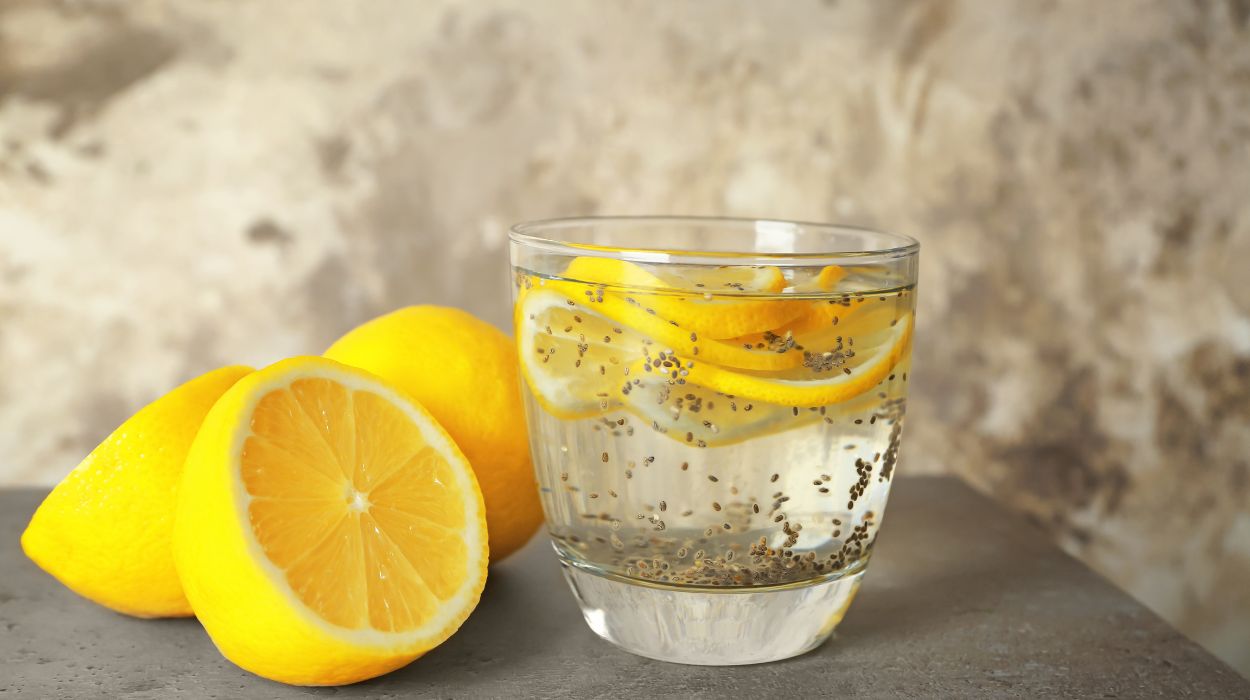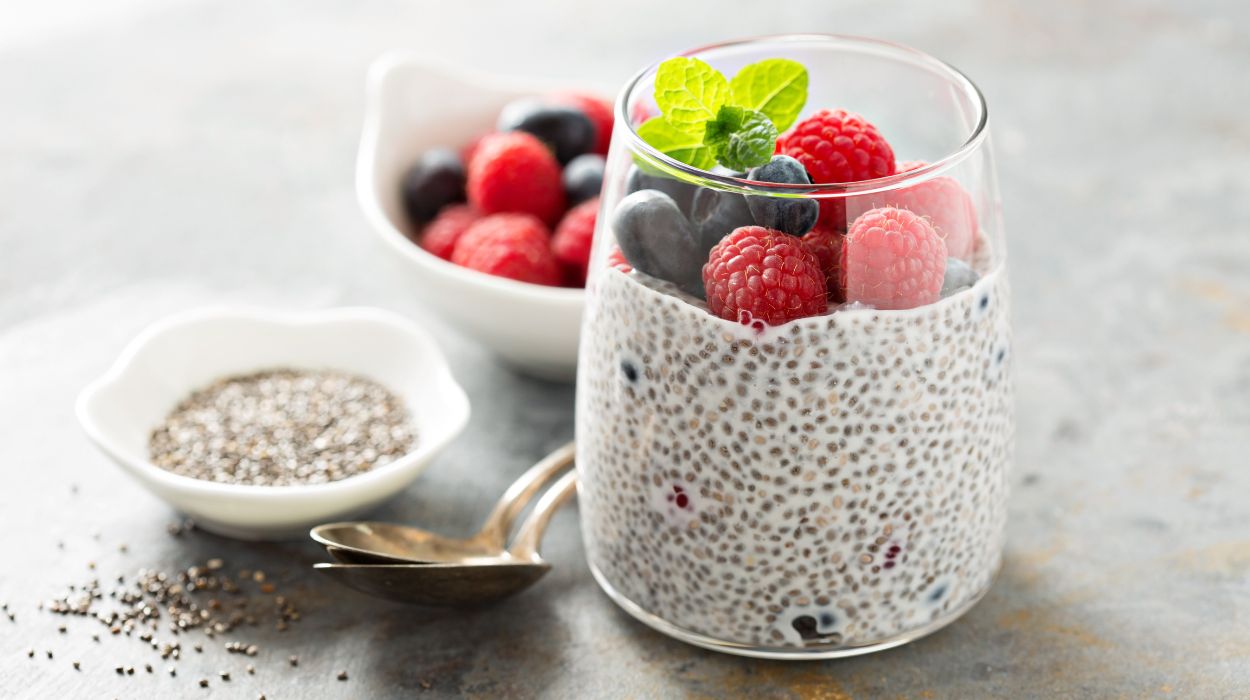Over the last decade, chia seeds for weight loss have become a hot topic in nutrition. Rich in omega-3 fatty acids, dietary fiber, and protein, these tiny seeds are considered a superfood.
But can drinking chia seed water before bed help you lose weight? Let’s explore this strategy of consuming chia seeds before bed.
Can You Drink Chia Seeds Before Bed To Lose Weight?
Yes, you can. However, some people might experience digestive discomfort if they consume chia seeds and go to bed right away. It is best to give your body some time to digest before sleeping.
Can I Drink Chia Seeds Before Bed For Weight Loss?
While there’s no specific ‘best’ time to drink chia seeds, incorporating them into your diet in the evening may help curb nighttime snacking, potentially aiding weight loss.
Chia seeds are a nutritious option for a late-night snack. However, some people might experience digestive discomfort if they consume chia seeds and go to bed right away. It is best to give your body some time to digest before sleeping. You might even find that chia seeds serve you better in morning drinks for weight loss.
Generally, 20-25 grams of chia seeds (approximately two tablespoons) per day is considered enough to reap chia seeds’ potential weight loss benefits.
Health Benefits Of Drinking Chia Seed Water

Chia seeds, native to Mexico and Guatemala, have been praised for their remarkable nutritional profile and potential health benefits. From enhancing healthy digestion to promoting heart health, these tiny seeds have a lot to offer.
Dense Nutrition
Chia seeds are a nutrient-dense food, meaning they pack a lot of essential nutrients[1] in a small number of calories. They are among the healthiest foods on the planet, earning them the title of a “superfood.” Here is a breakdown of what makes chia seeds special:
- Fiber: Chia seeds are one of the best sources of fiber. Each serving (28 grams or about 2 tablespoons) provides 11 grams of fiber. High-fiber foods like chia seeds are linked to a reduced risk of heart disease and type 2 diabetes and can help promote a healthy digestive system.
- Protein: Chia seeds are an excellent source of plant-based protein, providing about 4 grams per serving. In fact, chia seeds are a key ingredient in some of the best vegan meal replacement shakes.
- Omega-3 Fatty Acids: Chia seeds are among the best foods high in omega-3. They are an excellent plant-based source of alpha-linolenic acid (ALA), a type of omega-3 fatty acid linked to reduced inflammation and lower risk of chronic diseases such as heart disease and cancer.
- Antioxidants: Chia seeds are high in antioxidants which fight off harmful free radicals in the body and prevent cellular damage.
- Micronutrients: Chia seeds are also a good source of several important minerals, including calcium, magnesium, and phosphorus.
Digestive Health
Chia seeds offer notable benefits for digestive health.[2] When chia seeds are exposed to liquid, they form a gel-like substance due to the soluble fiber they contain. This gel adds bulk to stool, which aids in digestion and helps prevent constipation.
The soluble fiber in chia seeds also has a prebiotic effect,[3] feeding the beneficial bacteria in your gut, which can help maintain healthy gut flora. Balanced gut microbiota[4] can contribute to overall health benefits, including improved mood and stronger immune function.
Moreover, because the fiber in chia seeds slows down the rate at which food moves through your intestines, it can help control blood sugar levels by slowing the digestion and absorption of sugar. This makes chia seeds a beneficial addition to the diet of people trying to manage diabetes or those working towards weight loss goals.
How To Drink Chia Seeds For Weight Loss?
Chia Seed Water: A Step-By-Step Guide
- Soak chia seeds in water (chia to water ratio should be approximately 1:10).
- Let the mixture sit for at least 20-30 minutes to allow the seeds to absorb water. Letting them soak overnight is even better.
- For added flavor, squeeze some fresh lemon juice into the drink.
- Stir well before drinking.
Other Ways To Adding Chia Seeds Into Your Nightly Routine
Incorporating chia seeds into your nightly routine doesn’t have to be a chore. In fact, with a little creativity, it can be a delightful culinary adventure. Here are some ways you can add this superfood to your diet:
Chia Pudding

This is perhaps the easiest and most common way to enjoy chia seeds. Mix a quarter-cup of chia seeds with one cup of liquid (like almond milk or coconut milk). Let the mixture sit for a few hours or overnight. The result is a creamy, gelatinous pudding. You can flavor your chia pudding with vanilla, sweeten it with honey or maple syrup, and top it with fresh fruit or nuts.
Sprinkle On Salads
For a bit of added crunch and nutrients, sprinkle chia seeds over your dinner salad. They pair well with all types of greens and dressings.
Add To Dinner Recipes
You can also add chia seeds to your main course. Mix them into meatballs or burger patties, or use them as a thickener for soups and stews.
Smoothie Bowls
Adding a tablespoon of chia seeds can boost the nutritional profile of a smoothie bowl for dessert or a late-night snack. They add a nice texture and are virtually tasteless, so they won’t interfere with your favorite smoothie flavors.
“Overnight” Oats
Mix chia seeds into your overnight oats to create a more filling and nutritious meal for any time of the day. The seeds will absorb liquid, making the oats more substantial and satisfying.
Remember, it is always best to soak chia seeds or mix them with liquid before eating them. This process makes them easier to digest and allows your body to access the dense nutrients inside the seeds more effectively. So get creative, and enjoy incorporating chia seeds into your nightly routine!
Information About Chia Seeds For Weight Loss
Embarking on a weight loss journey involves dietary changes that promote a feeling of fullness, reduce hunger, and help you maintain a reduced calorie intake. Thanks to their unique properties,[5] chia seeds can be an ally in this process.
The Science Of Chia Seeds & Weight Loss
Chia seeds can play a significant role in weight loss strategies. They are rich in dietary fiber, with about 40% of their weight made up of roughage. Due to their ability to absorb up to 12 times their weight in water, chia seeds can help curb your appetite.
When the soluble fiber in chia seeds absorbs water, it forms a gel-like substance that can help you feel more full and satisfied, potentially reducing calorie intake and helping to prevent overeating. This process of water absorption and subsequent expansion can make you feel full for longer, effectively acting as a natural appetite suppressant.
Additionally, chia seeds contain nearly five grams of protein per one-ounce serving. Protein not only helps build and maintain muscle mass but is also known to promote feelings of satiety. A study by Dhillon in 2016 found that protein’s effects on feelings of fullness[6] contribute to its weight management effects.
Debunking Common Myths About Chia Seeds & Weight Loss
While chia seeds have many properties that can promote weight loss, debunking some common myths is crucial.
First, chia seeds alone won’t make you lose weight. Weight loss is typically the result of a sustained calorie deficit, which involves consuming fewer calories than your body uses.
Similarly, while chia seeds can help support weight loss efforts, they should be part of a broader, well-balanced diet and healthy lifestyle that includes regular physical activity.
Relying solely on chia seeds for weight loss without considering other aspects of your diet and lifestyle is unlikely to yield significant results. Sustainable weight loss usually results from a combination of factors, including a balanced diet, regular exercise, and a healthy lifestyle. So while chia seeds can certainly be part of your weight loss strategy, they aren’t a magic bullet.
Conclusion
Incorporating chia seed water into your nightly routine could be a step forward in your weight loss journey. They are nutrient-dense, can potentially help reduce your calorie intake, and offer several other health benefits. As with any dietary change, it is essential to consider the full context of your lifestyle and nutrition.
Frequently Asked Questions
While there’s no definitive best time, enjoying chia seeds before bed could potentially help curb late-night snacking and aid in weight loss.
Yes, but it’s best to give your body some time to digest before going to sleep to avoid potential digestive discomfort.
Chia seeds could support overall weight loss when incorporated into a balanced diet, but they are not a magic solution for losing belly fat specifically. Regular exercise and a healthy diet are key for losing weight in the abdominal area.
 Expert's opinion
Expert's opinion
